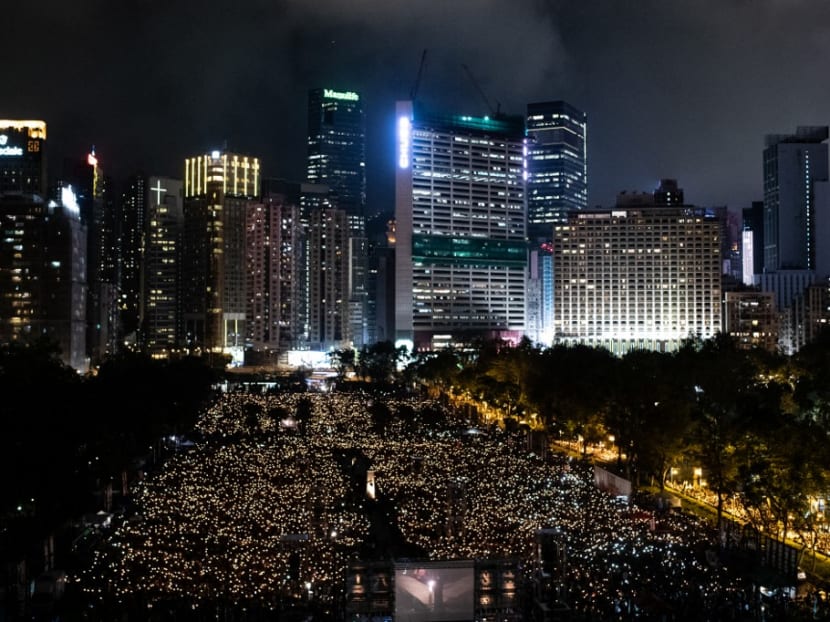Hong Kong police arrest Tiananmen vigil organisers
HONG KONG — Hong Kong police on Wednesday (Sept 8) arrested four members of the group behind the city's Tiananmen Square vigils, a day after they refused to cooperate with a national security investigation.

In this file photo taken on June 4, 2019, people attend a candlelight vigil at Victoria Park in Hong Kong to mark the 30th anniversary of the 1989 Tiananmen crackdown in Beijing. Hong Kong police on Sept 8, 2021 arrested multiple members of the group behind the city's Tiananmen Square vigils, a day after their organisation declared they would refuse to cooperate with a national security investigation.
HONG KONG — Hong Kong police on Wednesday (Sept 8) arrested four members of the group behind the city's Tiananmen Square vigils, a day after they refused to cooperate with a national security investigation.
The Hong Kong Alliance is the latest target of a sweeping national security law that China imposed on the city last year to quash dissent after huge and often violent democracy protests.
Prominent barrister Chow Hang-tung, vice-chairwoman of the alliance, was led away by security police in handcuffs from her office building in the city's central business district.
Three other members of the group — Mr Simon Leung, Mr Sean Tang and Mr Chan To-wai — were arrested on Wednesday morning, the alliance said in a statement.
Police confirmed that they arrested three men and one woman for "not providing information" according to the national security law.
The alliance is one of several pro-democracy groups being investigated by the city's newly created national security unit.
Last month, police ordered the group to hand over financial and operational details, accusing it of working as a "foreign agent".
The request included the personal details of all members since its founding in 1989, all meeting minutes, financial records and any exchanges with other non-governmental organisations advocating for democracy and human rights in China.
On Tuesday, the deadline for the request, members of the alliance handed police a letter saying the request was illegal, arbitrary and that no evidence of their wrongdoing had been presented.
The alliance also rejected the accusation that they are foreign agents, saying they are a domestic group that campaigns for Hong Kongers.
"Any law enforcement actions taken by the law enforcement agencies are based on evidence, strictly according to the law," the Security Bureau said after the arrests, warning that those who refuse to cooperate face fines and up to six months in jail.
'UNPATRIOTIC'
China is currently remoulding Hong Kong in its own authoritarian image.
Dozens of democracy figures — including multiple alliance members — have been arrested on national security charges and an official campaign has been launched to purge the city of anyone deemed "unpatriotic".
The business hub's once outspoken vibe has been transformed over the course of the last year with each month bringing new rules and restrictions.
Films are now censored for political content, curriculums have been rewritten, dissident artists and popstars find themselves unable to find venues and dozens of civil society groups have disbanded.
The alliance, officially named the Hong Kong Alliance in Support of Patriotic Democratic Movements of China, was once one of the most visible symbols of the city's previous political plurality.
Each June 4, the day of China's deadly Tiananmen Square crackdown in 1989, it organised large candlelight vigils in Hong Kong's Victoria Park that were routinely attended by tens of thousands of residents, with crowds swelling in recent years as anger intensified over how Beijing was running the city.
Slogans at the vigils often called for democracy in China and an end to one-party rule.
Tolerance for such political defiance has since ended, especially after rising anger towards Beijing's rule exploded with 2019's months of protests.
The last two Tiananmen vigils were banned by police and city officials earlier this year shuttered a museum operated by the alliance.
Authorities in China and Hong Kong have also said that future vigils would likely break the new security law. AFP









